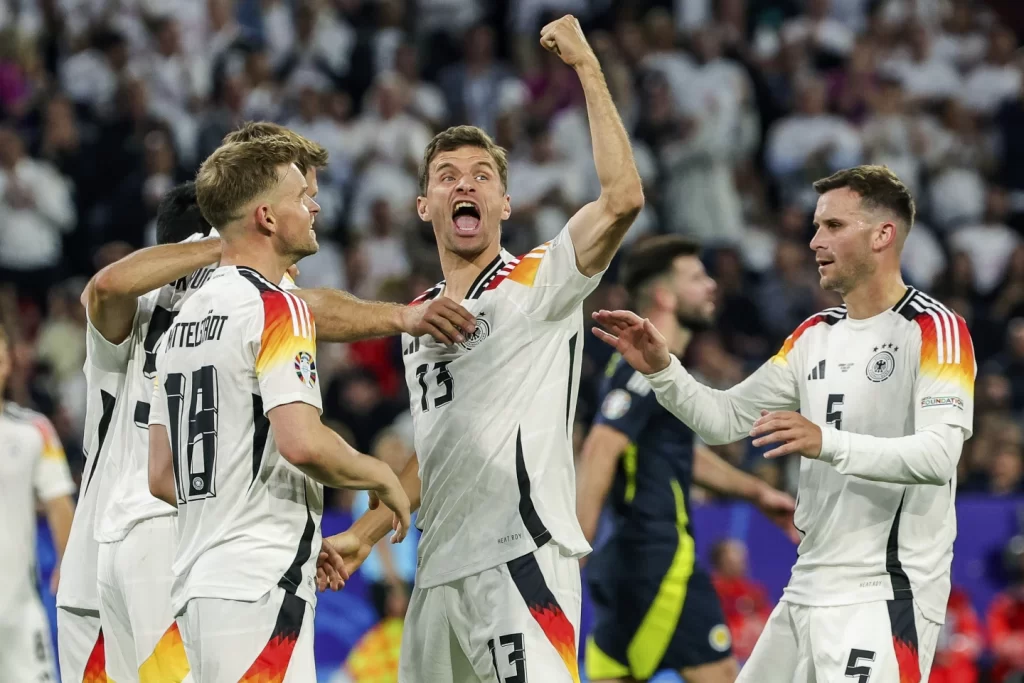
Germany’s resounding 5-1 victory over Scotland in Friday’s Euro 2024 opener has energized home fans and highlighted the effective strategies of coach Julian Nagelsmann.
In his first year as coach, Nagelsmann has managed to strike a balance in a team that has struggled in major tournaments since their 2014 World Cup win.
Germany’s first two goals exemplified their blend of past, present, and future. The first goal saw a long pass from Toni Kroos to Joshua Kimmich, who set up Florian Wirtz for a sidefooted finish. For the second, captain Ilkay Gundogan’s delicate pass found Kai Havertz, who assisted Jamal Musiala’s powerful shot into the net.
“We couldn’t have had a better start. We’ve seen the atmosphere in the country, and we need that,” Musiala said of Germany’s strong opening.
Pre-tournament expectations were modest following Germany’s disappointing exits from their last three major tournaments. However, they have now achieved their biggest victory in Euros history.
The first half ended disastrously for Scotland when defender Ryan Porteous was sent off, and Kai Havertz converted the resulting penalty kick. Substitutes Niclas Füllkrug and Emre Can added to Scotland’s woes in the second half.
“The first 20 minutes were very impressive. The first goals were very good,” said Germany coach Julian Nagelsmann. “It’s very valuable that many players performed well early on.
“It was only the first step but a very good one and we can build on this one. We’re very happy.”
Scotland, which hadn’t managed a shot on goal all match, eventually scored a late consolation goal when Antonio Rüdiger deflected the ball into his own net.
Steve Clarke’s side will need to improve against Hungary and Switzerland to advance from Group A.
“Difficult night. We didn’t play to our standard. The German team were excellent,” Clarke said.
“We feel as though we’ve let ourselves down. We’re better than that. Hopefully we can show that the next two games.”
Scotland’s supporters started the match in high spirits but were quickly silenced when Wirtz scored in the 10th minute.
Toni Kroos executed a brilliant crossfield lob to Joshua Kimmich, who then rolled the ball across for Wirtz to score.
Wirtz became Germany’s youngest Euros goal-scorer at 21. Musiala, just 67 days older, doubled Germany’s lead nine minutes later with a well-executed goal involving Havertz.
Right before halftime, Scotland’s goalkeeper Angus Gunn parried a header from Gündoğan, but when the captain appeared ready to score, he was brought down by a challenge from Porteous, leading to a red card and a penalty converted by Havertz.
In the second half, Germany maintained control until Füllkrug, a substitute, scored a powerful goal after an attempted exchange between Musiala and Gündoğan.
Scotland’s consolation came from Kieran McKenna’s header, which deflected in off Rüdiger.
Germany’s fifth goal came from Emre Can in stoppage time. Can, a late replacement for the ill Aleksandar Pavlovic, described his unexpected contribution: “A great feeling and a crazy story … I was on vacation two days ago” Can told ZDF. “Then the call came on Wednesday, and on Wednesday evening I met up with the team, trained once yesterday, came in today (off the bench), scored a goal. I’m thankful to Julian (Nagelsmann) and the whole coaching staff that they put their trust in me.”
Before the match, late German soccer legend Franz Beckenbauer was honored, and notable attendees included German President Frank-Walter Steinmeier, Scotland First Minister John Swinney, and Hungarian Prime Minister Viktor Orbán.
Germany will face Hungary next on Wednesday, while Scotland will play against Switzerland.
